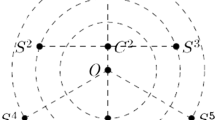Abstract
We propose a method for the random generation of classifier outputs with specified individual accuracies and fixed pairwise agreement. A diversity measure (kappa) is used to control the agreement among classifiers for building the classifier teams. The generated team outputs can be used to study the behaviour of class-type combination methods such as voting rules over multiple dependent classifiers.
Access this chapter
Tax calculation will be finalised at checkout
Purchases are for personal use only
Preview
Unable to display preview. Download preview PDF.
Similar content being viewed by others
References
Aksela M (2003) Comparison of Classifier Selection Methods for Improving Committee Performance. 4th International Workshop on Multiple Classifier Systems, Guildford, UK, LNCS 2709, 84–93
Lecce VD, Dimauro G, Guerrierro A, Impedovo S, Pirlo G, Salzo A (2000) Classifier Combination: The Role of A-Priori Knowledge. In: 7th International Workshop On Frontiers In Handwriting Recognition. Amsterdam 143–152
Duin RPW (2002) The Combining Classifier: To Train or not to Train?. ICPR16, Proceedings 16th International Conference on Pattern Recognition, Quebec City, Canada, Vol. II, IEEE Computer Society Press, Los Alamitos, 765–770
Zouari H, Heutte L, Lecourtier Y, Alimi A (2003) Simulating Classifier Outputs for Evaluating Parallel Combination Method. 4th International Workshop on Multiple Classifier Systems, Guildford, UK, LNCS 2709, 296–305
Tax DMJ, Breukelen MV, Duin RPW, Kittler J (2000) Combining Multiple Classifiers by Averaging or by Multiplying?. Pattern Recognition 33:1475–1485
Breiman L (1996) Bagging Predictors. Machine Learning 24:123–140
Kuncheva LI and Whitaker CJ (2003) Measures of Diversity in Classifier Ensembles and their Relationship with the Ensemble Accuracy. Machine Learning 51:181–207
Fleiss J (1981) Statistical Methods for Rates and Proportions. John Wiley and sons
Kuncheva LI and Kountchev RK (2002) Generating Classifier Outputs of Fixed Accuracy and Diversity. Pattern Recognition Letters 23:593–600
Kittler J, Hatef M, Duin RPW and Matas J (1998) On Combining Classifiers. IEEE Transactions on Pattern Analysis and Machine Intelligence 20:226–239
Author information
Authors and Affiliations
Editor information
Editors and Affiliations
Rights and permissions
Copyright information
© 2005 Springer-Verlag Berlin Heidelberg
About this paper
Cite this paper
Zouari, H., Heutte, L., Lecourtier, Y. (2005). Using Diversity Measure in Building Classifier Ensembles for Combination Method Analysis. In: Kurzyński, M., Puchała, E., Woźniak, M., żołnierek, A. (eds) Computer Recognition Systems. Advances in Soft Computing, vol 30. Springer, Berlin, Heidelberg. https://doi.org/10.1007/3-540-32390-2_39
Download citation
DOI: https://doi.org/10.1007/3-540-32390-2_39
Publisher Name: Springer, Berlin, Heidelberg
Print ISBN: 978-3-540-25054-8
Online ISBN: 978-3-540-32390-7
eBook Packages: EngineeringEngineering (R0)




